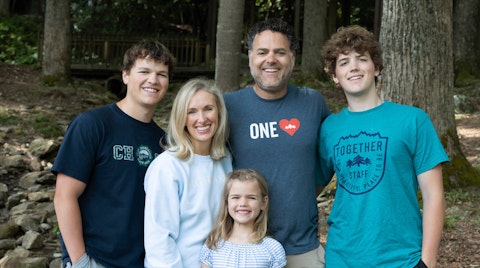

Hello from Old Forge Mountain,
New Camper Families!
It’s May, which means the countdown is officially on—camp is just around the corner! Here at Camp Highlander, our team is buzzing with excitement as we put the finishing touches on everything for your arrival. Today, we’re thrilled to kick off our New Camper Blog Series, a special collection of posts designed just for you—our first-time camper families.
My name is Melissa Fitzgerald, and I have the incredible privilege of being one of the owners and directors (along with my husband Bryan) here at Camp Highlander. One of my favorite parts of this role is getting to work closely with you, our new camper families. You may have already heard from a few of our team members as we’ve been reaching out to answer your questions and help you prepare for your child’s first summer with us.
Throughout this blog series, we’ll walk you through some of the most helpful tips, insights, and stories to help your family feel confident and excited about camp. Each post will focus on a different aspect of life at Camp Highlander, giving you a behind-the-scenes look at what to expect and how to make the most of your camper’s first experience.
Today, in our series…we are starting with a list of things your camper can “practice” at home to help prepare them for the adjustments to camp life.
Getting Ready for Bed
Are you still brushing your child’s teeth or helping them with their nighttime routine? For some parents, these responsibilities may have ended years ago—but for others, they might still be part of the daily rhythm. If your child isn’t fully independent with their “getting ready for bed” routine, now is a great time to start practicing.
Encourage your child to take ownership of things like brushing their teeth, turning on the shower, washing their hair and body, drying off, choosing pajamas, cleaning up dirty clothes, and brushing their hair after a shower.
We recommend having a few “practice camp nights” where your child handles their entire bedtime routine on their own—without reminders or help. This not only builds confidence but also prepares them to feel comfortable and capable at camp, where they’ll be doing these things independently.
Sleeping:
Most kids aren’t used to sleeping in a room with a bunch of others—but at camp, it’s one of the most exciting parts! Like a giant sleepover, it may take a little getting used to.
Help your child prepare by practicing bedtime without a sound machine or nighttime visits to your room. Talk about simple ways to feel comforted at camp, like hugging a stuffed animal or imagining a favorite story. Camp days are full and fun, so sleep usually comes easy—but a little prep can help ease the transition.
Getting Ready for the Day:
Just like getting ready for bed, your child will also need to get themselves ready for the day at camp. At home, many parents help pack bags, lay out clothes, or handle the morning routine—but at camp, with the help and support of their counselors.
Start practicing at home! Have your child pick out their own clothes (based on what the day holds), make their bed, pack a day bag, and clean up their space. Can they do their own hair? Apply sunscreen? Even packing their own lunch or school bag can be a great way to practice thinking ahead and making independent choices. The more they can do on their own now, the more confident and prepared they’ll feel at camp!


Choosing Food/Fueling Your Body:
At camp, we eat the BEST food—and there’s always a lot of variety! Each meal includes a hot food option that’s served at the table. In addition, campers can visit the salad bar, sandwich bar, or fruit bar to fix their own plate with other options they enjoy.
Picky eaters usually do really well at camp, but it’s still helpful to talk with your child ahead of time about trying new foods, building a full plate, and drinking plenty of water. We’ll talk about these things at camp too, but it helps if they already understand why fueling their body is important—especially with all the activity we do here!


Practicing Being Quiet:
We have a Rest Hour every day after lunch—a much-needed quiet break for everyone, no matter their age. While many campers enjoy this time, it can be a challenge at first, especially for younger ones.
It’s a great idea to practice Rest Hour at home. Set aside some time on a weekend or after school, and encourage your child to settle in with quiet activities like reading, drawing, puzzles, or journaling. Aside from bathroom breaks, they should be able to stay quietly engaged without needing help or interruptions.
Campers can bring a few quiet-time items with them, and while we’ll help guide them at camp, practicing at home makes the transition easier. Rest Hour is a great skill for building independence and learning how to enjoy a little downtime.
Stay tuned for more helpful tips in the blog series to help prepare your child for camp. We’re so glad you’re here, and we can’t wait to welcome you in person. Let’s get ready for the best summer ever!
